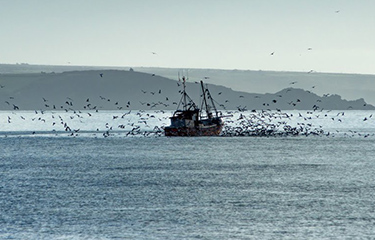Insight360 is currently performing at-sea trials of a new observation system that uses machine learning to refine bycatch monitoring.
Insight360 is the name of both the project and the electronic monitoring tool, developed in part with funding from the U.K. Department of Environment and Rural Affairs (Defra), which is intended to provide a complete 360-degree view of a fishing vessel. Arribada, a nonprofit tech company, is leading the technical development of the monitoring tool, which combines voice recognition and video information, along with machine learning, to enable real-time observation of what is happening on board a vessel during a bycatch event.
The technology, Insight360 said, is being refined with fishermen and is currently undergoing at-sea trials on five commercial fishing vessels working off the South West coast in Cornwall, England.
The ultimate goal of the new technology is to completely remove the need for manual review of observation footage by creating a monitoring tool that can automatically identify and record any harvests, aided by fishermen speaking out loud during their work. Microphones included in the system, along with voice recognition and speech-to-text technology, can then be combined with video footage to give a complete view of the event without fishermen having to pause their work.
“This is then sent back to the Insight360 team onshore for analysis, offering new insights into bycatch,” Insight360 said.
The system also logs vessel location, and according to Insight360 the data will be used to help understand more about “where and why bycatch happens” to help prevent it from happening in the first place.
“Insight360 presents an exciting and transformative development in at-sea monitoring of fisheries, with the potential to increase our understanding of where and why bycatch happens through the integration of novel technologies such as artificial intelligence and machine learning to unlock new capabilities for fishermen to share their story at sea,” Arribada Technical Director Alasdair Davies said in a release.
The initial target for Insight360 is a bycatch of cetacean species like dolphins and porpoises, which are sometimes accidentally caught in fishing nets. The system will be able to identify when the events occur both through video and voice acknowledgment of the crew, increasing the amount and accuracy of data available about bycatch.
“Our members were keen to be involved in Insight360 to assist in the bycatch mitigation work going on around the coast, and demonstrate how the knowledge of fishermen can support the development of innovative monitoring technologies,” Chair of the Cornish Sardine Management Association Gus Caslake said. “Providing a platform to test Insight360 at sea during commercial fishing operations will support the design of a system that meets the requirements of U.K. fisheries, in terms of the practicalities of fishing, the environment, and the needs of policy.”
The new observation system, Insight360 said, is due for completion in 2024.
England has been stepping up its efforts to use electronic monitoring. The U.K. Marine Management Organisation recently entered the final phase of its inshore vessel monitoring system (I-VMS) devices. The devices will soon be required on all vessels measuring 6 to 12 meters that are fishing in the nation’s waters – both foreign and domestic.
Photo courtesy of Insight360







